- Functions allow programmers to split code into separate reusable segments that each perform a specific task. The document discusses different types of functions including user-defined and library functions.
- Key aspects of functions like function definitions, declarations, parameters, return values, and calling functions are explained. Different ways of passing data to functions like passing arrays and strings are also covered.
- The document provides examples to illustrate concepts like passing arguments by value versus reference and categorizing functions based on their use of arguments and return values.
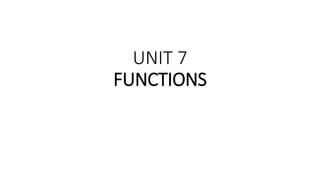










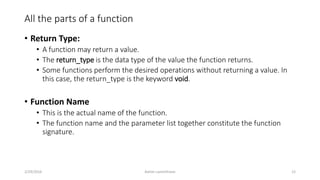




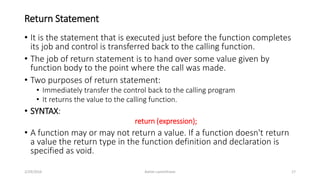








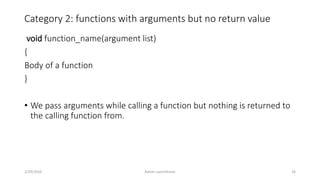




![• Syntax for function call passing array as argument,
function_name(array_name)
• Syntax for function prototype which accepts array
return_type function_name(data_type array_name[]);
Or
return_type function_name(data_type *pointer_variable);
• When array is passed to a function, the values of the array elements are not
passed to the function rather the array name is interpreted as the address
of the first array element.
• The address assigned to the corresponding formal argument when the
function is called.
• The formal argument therefore becomes a pointer to the first array
element.
Ashim Lamichhane 312/29/2016](https://image.slidesharecdn.com/functions-160229095817/85/Unit-7-Functions-31-320.jpg)
![#include <stdio.h>
void display(int n){
printf("%dt", n );
}
int main(void){
int nums[5]={100,23,44,3,65},i;
printf("nThe content of array is: n");
for (int i = 0; i < 5; i++){
display(nums[i]);
}
}
Ashim Lamichhane 322/29/2016](https://image.slidesharecdn.com/functions-160229095817/85/Unit-7-Functions-32-320.jpg)
![WAP to illustrate passing an entire array to a function
#include <stdio.h>
void change(int a[]){
a[0]=10;a[1]=20;a[2]=30;a[3]=40;a[4]=50;
}
int main(void){
int nums[5]={100,23,44,3,65},i;
printf("nBEFORE FUNCTION CALL: n");
for (int i = 0; i < 5; i++) {
printf("t%d",nums[i]);
}
printf("n");
change(nums); /* PASSING ARRAYS NUMS TO FUNCTION */
printf("nAFTER FUNCTION CALLn");
for (int i = 0; i < 5; i++) {
printf("t%d",nums[i]);
} printf("n");
}
Ashim Lamichhane 332/29/2016](https://image.slidesharecdn.com/functions-160229095817/85/Unit-7-Functions-33-320.jpg)
![Passing Strings to Functions
#include <stdio.h>
void Display(char ch[]);
int main(){
char c[50];
printf("Enter string: ");
gets(c);
Display(c); // Passing string c to function.
return 0;
}
void Display(char ch[]){
printf("String Output: ");
puts(ch);
}
• Here, string c is passed from main() function to user-defined function Display(). In function
declaration, ch[] is the formal argument.
Ashim Lamichhane 342/29/2016](https://image.slidesharecdn.com/functions-160229095817/85/Unit-7-Functions-34-320.jpg)






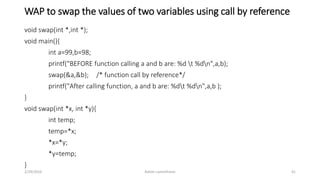




![#include <stdio.h>
int count = 1;
void func(int sum) {
sum = sum + count;
count ++;
if(count <=9){
func(sum);
} else {
printf("nSum is [%d] n", sum);
} return;
}
int main(void) {
int sum = 0;
func(sum);
return 0;
}
Explanation
• When func() was called through main(), ‘sum’
was zero.
• For every call to func(), the value of ‘sum’ is
incremented with ‘count’ (which is 1 initially),
which itself gets incremented with every call.
• The condition of termination of this recursion
is when value of ‘count’ exceeds 9. This is
exactly what we expect.
• When ‘count’ exceeds 9, at this very moment,
the value of ‘sum’ is the final figure that we
want and hence the solution.
2/29/2016 Ashim Lamichhane 46](https://image.slidesharecdn.com/functions-160229095817/85/Unit-7-Functions-46-320.jpg)
![#include <stdio.h>
int func(int num) {
int res = 0;
if(num <= 0){
printf("n Error n");
}else if(num ==1){
return num;
}else {
res = num * func(num -1);
return res;
}
return 0;
}
int main(void) {
int num = 5 ;
int fact = func(num);
if (fact > 0)
printf("n The factorial of [%d] is [%d]n", num, fact);
return 0;
}
• res = 5 * func(5 -1); // This is func() stack 1
• res = 4 *func(4-1); // This is func() stack 2
• res = 3 *func(4-1); // This is func() stack 3
• res = 2 *func(2-1); // This is func() stack 4
• return 1; // This is func() stack 5
Take an example of sum
sum(5)
=5+sum(4)
=5+4+sum(3)
=5+4+3+sum(2)
=5+4+3+2+sum(1)
=5+4+3+2+1+sum(0)
=5+4+3+2+1+0
=5+4+3+2+1
=5+4+3+3
=5+4+6
=5+10
=15
2/29/2016 Ashim Lamichhane 47](https://image.slidesharecdn.com/functions-160229095817/85/Unit-7-Functions-47-320.jpg)













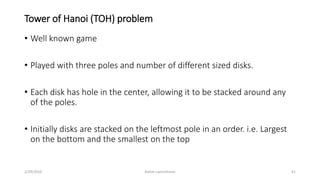



![Questions
• Write a function CalculateRoots() which receives three coefficients a,b,c of
quadratic equation ax2+bx+c=0 as its arguments and then calculates and
displays its roots.
• Write a recursive function like int findsum(int n) which receives an integer n
and returns sum of first n natural numbers.
• Write three functions: convertFromFeetToInches() which converts feet value
to inches, convertFromInchesToCentimeters() which converts inches to
centimeters and convertFromCentimetersToMeter() which converts
centimeters to meters. Write a program that prompts a user for a
measurement in feet and then converts and displays this value in meters.
[Hint: 1 feet = 12 inches, 1 inch=2.54cm and 100cm = 1m]
2/29/2016 Ashim Lamichhane 65](https://image.slidesharecdn.com/functions-160229095817/85/Unit-7-Functions-65-320.jpg)
